Icelandic Camping 101: Making the Most of Your Campervan Rental Iceland Adventure
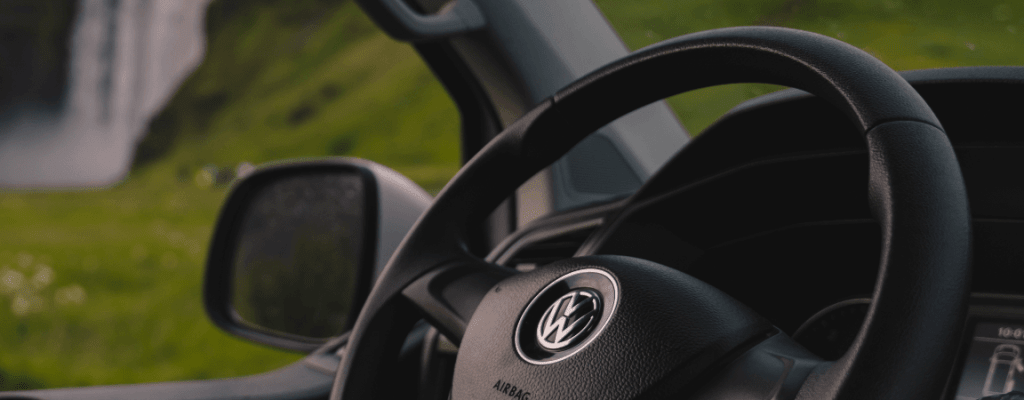
Ah, Iceland! A land of fire and ice, where geysers erupt with fervor, and glaciers stretch as far as the eye can see. It's a country that beckons adventurers and nature lovers alike. And what better way to explore this Nordic paradise than with a campervan rental? Iceland, with its vast landscapes and ever-changing weather, is perfect for a road trip. In this guide, we'll delve into the essentials of making the most of your campervan journey in Iceland.
1. Why Choose a Campervan Rental in Iceland?
Embracing the campervan lifestyle in Iceland is about more than just convenience; it's about immersing yourself fully in the Icelandic experience. Here are compelling reasons to opt for a campervan rental:
Unparalleled Flexibility:
With a campervan, you're not tied to hotel check-in and check-out times. Feel like watching the sunset at a particular spot or waking up to the sound of waves? You can, without any constraints.
Cost-Effective:
Over the duration of your trip, renting a campervan can be more economical. You save on accommodation costs, and with the added benefit of a kitchen, you can also save on food expenses by cooking your meals.
Comfort of Home on Wheels:
After a long day of exploring, there's something comforting about returning to your own space. Your campervan becomes a tiny home on wheels, equipped with your belongings and essentials, offering a cozy retreat no matter where you are.
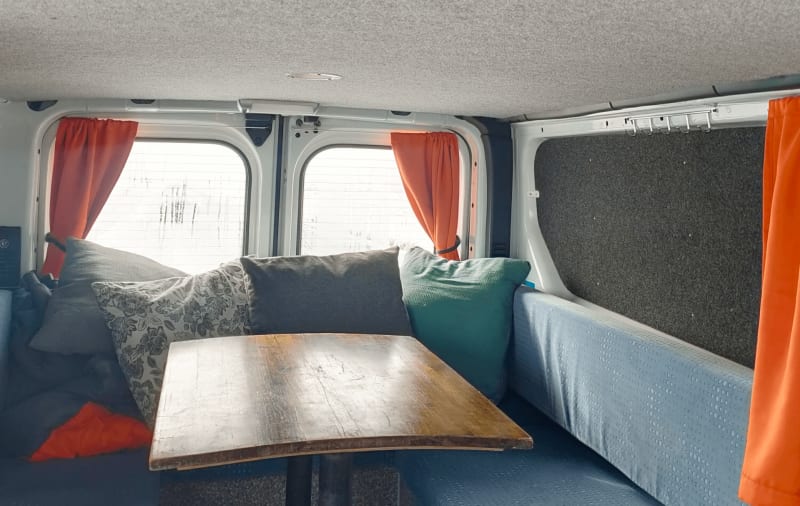
Camping allows you to be closer to nature. Whether it's parking beside a serene fjord, under the Northern Lights, or near a bubbling geothermal spring, the experience is raw and real.
Eco-Friendly Travel:
By consolidating your transportation and accommodation into one, you're reducing your carbon footprint. Plus, with many campervans now offering eco-friendly features, you can travel with a lighter environmental conscience.
Off-the-Beaten-Path Adventures:
While Iceland's main attractions are a must-visit, a campervan gives you the freedom to explore lesser-known gems. Those hidden waterfalls, secluded beaches, and quaint villages become easily accessible.
2. Timing Your Campervan Adventure: When to Hit the Icelandic Roads
Iceland, with its ever-changing landscapes and unpredictable weather, offers a unique experience every season. When you're considering a campervan rental in Iceland, timing is everything. Here's a deeper dive into the best times to embark on your campervan journey:
Summer (June to August):
- Midnight Sun: One of the most enchanting phenomena, the Midnight Sun, graces Iceland during the summer months. This means extended daylight hours, sometimes up to 24 hours, allowing you to maximize your exploration time.
- Warmest Weather: With temperatures hovering around 10°C to 15°C, summer is the warmest time to visit. It's ideal for those who prefer milder conditions.
- Bustling Festivals: Summer is festival season in Iceland. From music festivals in Reykjavik to cultural celebrations in small towns, there's always something happening.
- Wildlife Watching: Puffins, seals, and whales are more active and visible during these months, making it a prime time for wildlife enthusiasts.
Autumn (September to November):
- Aurora Borealis: As the nights get longer, the chances of witnessing the Northern Lights increase. The ethereal green, pink, and purple hues dancing across the sky is a sight to behold.
- Colorful Landscapes: The Icelandic terrain transforms into a canvas of red, orange, and yellow hues, offering picturesque views at every turn.
- Fewer Tourists: As the peak tourist season winds down, you'll find fewer crowds at popular attractions, giving you a more intimate experience.
Winter (December to February):
- Snow-Capped Wonder: The landscapes, blanketed in snow, offer a magical winter wonderland vibe. It's perfect for those seeking a white winter experience.
- Winter Activities: This is the time for snowmobiling, ice caving, and glacier hiking. Plus, the geothermal pools feel even more inviting in the cold.
- Considerations: While winter has its charm, it's essential to be prepared. The roads can be challenging, and daylight hours are limited. Ensure your campervan rental in Iceland is winter-ready and always check the weather forecasts.
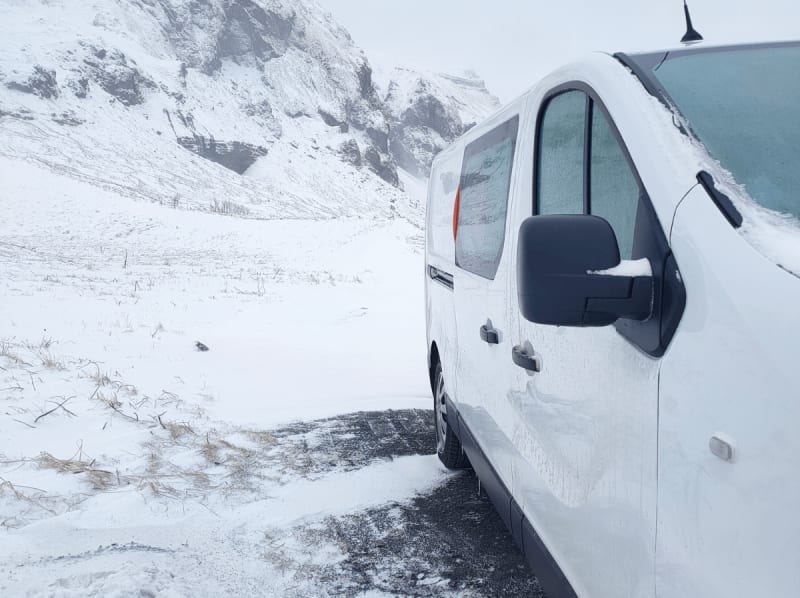
Spring (March to May):
- Nature's Reawakening: Witness Iceland come back to life with blooming flowers, gushing waterfalls, and the chirping of migratory birds.
- Milder Weather: The temperatures start to rise, making it a pleasant time to travel, especially for those looking to avoid the summer rush.
- Extended Daylight: The days gradually get longer, providing ample time for exploration.
3. Essential Tips for Driving a Campervan in Iceland
Navigating the diverse terrains of Iceland in a campervan is an adventure in itself. However, to ensure a smooth and safe journey, it's crucial to be well-prepared and informed. Here are some indispensable tips for driving a campervan rental in Iceland:
Understand the Road Signs:
- Unique Symbols: Some Icelandic road signs might be unfamiliar to international travelers. For instance, a sign with an exclamation mark might indicate a sudden change in road conditions or other potential hazards.
- Bridge Signs: Single-lane bridges are common in Iceland. A triangular sign indicates that you should give way to vehicles coming from the other direction if they're closer to the bridge.
Weather and Road Conditions:
- Stay Updated: Icelandic weather is notoriously unpredictable. Always check the weather forecast and the Road Administration's website for real-time updates on road conditions.
- Winter Considerations: Snow and ice can make roads slippery. Ensure your campervan rental in Iceland is equipped with winter tires and always drive cautiously.
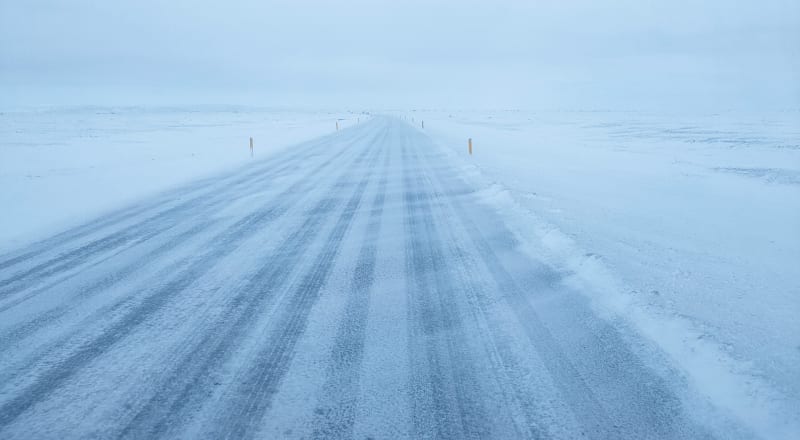
Respect Speed Limits:
- General Rule: In urban areas, the limit is usually 50 km/h, while on rural roads, it's 80 km/h for gravel roads and 90 km/h for paved ones. *** Safety First:** Adjust your speed according to road and weather conditions, even if it means driving below the speed limit.
Off-Road Driving is Prohibited:
- Protect the Environment: Iceland's landscapes are delicate. Driving off designated roads can cause irreversible damage to the vegetation and disrupt the ecosystem.
- Legal Implications: Off-road driving is not only harmful but also illegal. You can face hefty fines if caught.
Fuel Up Regularly:
- Sparse Gas Stations: In remote areas of Iceland, gas stations can be few and far between. It's a good practice to refuel when you're at half tank to avoid any inconveniences.
- Payment: Most gas stations accept credit cards, but it's wise to have a PIN for your card or some cash on hand.
Be Cautious of Wildlife:
- Sheep on the Move: Especially in summer, sheep roam freely and can suddenly dart onto the road. Always be vigilant and reduce speed when you see them near the roadway.
- Birds in Flight: In coastal areas, birds like the Arctic Tern might swoop down onto roads. Drive slowly and give them space.
Prepare for All Terrains:
- Gravel Roads: A significant portion of Iceland's roads are gravel, especially in the Highlands. Reduce speed, keep a safe distance from other vehicles to avoid flying stones, and always approach bends with caution.
- Mountain Passes: Some routes, especially in the Westfjords, involve navigating steep mountain passes. Ensure your campervan's brakes and engine are in top condition.
Camping Rules:
- Designated Areas: Always camp in designated camping areas. Wild camping in a campervan is prohibited in Iceland.
- Respect Nature: Leave no trace behind. Dispose of waste properly and avoid making loud noises, especially at night.
4. Campsites and Overnight Stays in Iceland
Embarking on a campervan journey through Iceland offers the promise of freedom, adventure, and ever-changing scenic views. However, when the day's drive is done, and it's time to rest, you'll need to know where to park for the night. Here's a guide to campsites and overnight stays when you're exploring Iceland with a campervan rental:
Camping Card Advantage:
- Cost-Effective: If you're planning to stay at multiple campsites, consider purchasing the Iceland Camping Card. It offers access to around 40 campsites across the country without additional nightly fees.
- Duration: The card is valid for 28 nights for up to two adults and four children, making it ideal for extended trips.
- Find the camping card here: Camping Card
Wild Camping Rules:
- Campervan Restrictions: Unlike tents, campervans are not allowed to wild camp outside of designated camping areas. This is to protect the environment and ensure the safety of travelers.
- Respect the Land: Always adhere to local regulations and guidelines. Iceland's nature is fragile, and it's our responsibility to leave no trace.
Amenities at Campsites:
- Basic Facilities: Most campsites offer essential amenities like toilets, showers, and waste disposal points. Some might even have laundry facilities and kitchen areas.
- Electricity and Wi-Fi: While many campsites provide electrical hook-ups and Wi-Fi, it's a good idea to check in advance, especially if these are crucial for your journey.
Seasonal Considerations:
- Summer Surge: Campsites in popular areas can get crowded during the peak summer months. It's advisable to arrive early in the day to secure a spot.
- Winter Camping: Not all campsites are open year-round. If you're traveling in the off-season, research campsites that operate during winter and offer facilities like heated restrooms.
Respecting Campsite Etiquette:
- Quiet Hours: Most campsites have quiet hours, usually from 11 pm to 7 am. Ensure you respect these timings to avoid disturbing fellow campers.
- Clean Up: Always leave your camping spot cleaner than you found it. Use designated waste disposal areas and avoid littering.
Booking in Advance:
- Peak Season: If you're traveling during the busy summer months, consider booking your campsites in advance, especially in popular tourist areas.
- Flexibility: One of the joys of campervan travel is spontaneity. While booking ahead can provide peace of mind, many campsites also accommodate drive-ins.
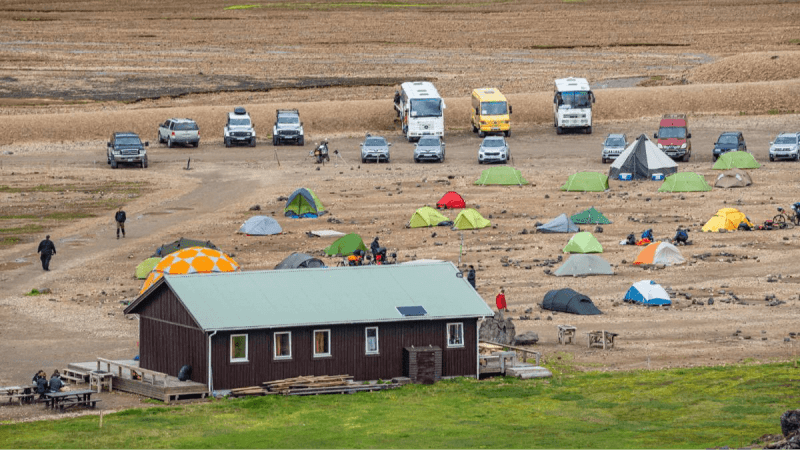
Safety First:
- Weather Warnings: Iceland's weather can be unpredictable. Always check weather forecasts and be prepared to change your plans if conditions become unfavorable.
- Secure Your Campervan: Even in the serene landscapes of Iceland, it's essential to lock your campervan when you're away from it.
Cultural Experiences:
- Local Recommendations: Engage with locals and fellow travelers at campsites. They can offer invaluable recommendations for hidden gems and must-visit spots in the vicinity.
- Support Local: Many campsites are located near local towns and villages. Consider exploring these areas, dining at local eateries, and purchasing regional products.
5. Packing Essentials for Your Campervan Adventure
Setting out on a campervan journey through Iceland's breathtaking landscapes is a dream for many. But, to ensure that the experience is as comfortable and hassle-free as possible, packing right is crucial. Here's a comprehensive guide on what to bring along for your campervan rental adventure in Iceland:
Weather-Appropriate Clothing:
- Layer Up: Iceland's weather can be unpredictable. Packing layers, including thermal wear, fleece jackets, and waterproof outer layers, ensures you're prepared for all conditions.
- Waterproof Gear: Rain can surprise you anytime in Iceland. Waterproof jackets, trousers, and sturdy waterproof shoes are essential.
- Warm Accessories: Don't forget hats, gloves, scarves, and warm socks. Even in summer, evenings can get chilly.
Navigation and Communication:
- Offline Maps: While driving through remote parts of Iceland, you might not always have a strong internet connection. Download offline maps or invest in a good road atlas.
- Chargers and Adapters: Ensure you have the right adapters for Iceland and a multi-port charger. Consider bringing a power bank for backup.
Kitchen and Cooking:
- Compact Cooking Gear: If your campervan doesn't come with a full kitchen set, pack a portable stove, lightweight pots, and pans, and essential utensils.
- Reusable Cutlery and Plates: Opt for eco-friendly, reusable options to minimize waste.
- Food Staples: Stock up on non-perishable items like pasta, rice, canned goods, and snacks. You can buy fresh produce from local markets as you travel.
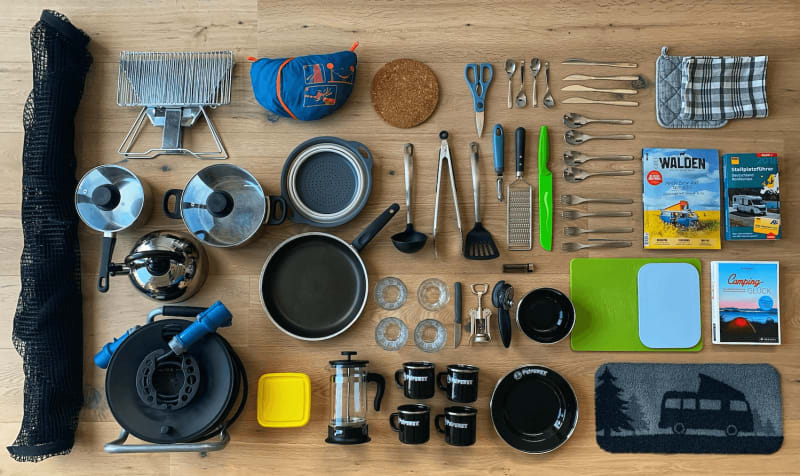
Sleeping Comforts:
- Sleeping Bags: Even if your campervan has bedding, an extra sleeping bag can provide added warmth on colder nights.
- Eye Masks and Earplugs: The midnight sun can be disorienting. An eye mask will ensure uninterrupted sleep, and earplugs can block out any external noises.
Safety and Health:
- First Aid Kit: Pack a basic first aid kit with band-aids, antiseptics, pain relievers, and any personal medications.
- Water Bottles: Stay hydrated. Bring refillable water bottles ? Iceland's tap water is pure and safe to drink.
- Sunscreen and Bug Spray: Yes, even in Iceland! The sun can be strong, especially when reflecting off snow, and certain areas might have midges or mosquitoes.
Entertainment and Leisure:
- Books and Games: For those relaxed evenings or rainy days, have a book or some board games handy.
- Camera and Binoculars: You'll want to capture Iceland's beauty. Don't forget extra memory cards and perhaps a pair of binoculars for wildlife spotting.
Eco-Friendly Essentials:
- Biodegradable Soap and Shampoo: Respect Iceland's pristine environment by using eco-friendly cleaning products.
- Reusable Bags and Containers: Minimize plastic waste by packing reusable shopping bags and food containers.
Documentation:
- Driving License and Rental Documents: Ensure you have your valid driving license and all necessary paperwork for your campervan rental.
- Travel Insurance: Always a good idea to have, especially when embarking on a road trip in unfamiliar terrains.
6. Making the Most of Your Campervan Experience
Embarking on a campervan journey through Iceland offers unparalleled freedom and the chance to intimately connect with nature. To ensure you make the most of this unique experience with your campervan rental in Iceland, consider the following tips:
Plan but Stay Flexible:
- Research Routes: While spontaneity is part of the charm, having a rough idea of your route ensures you don't miss key attractions.
- Weather Watch: Iceland's weather can change rapidly. Regularly check forecasts and be ready to adjust your plans accordingly.
Connect with Locals:
- Local Recommendations: Engage with locals to discover hidden gems, from secluded hot springs to the best local eateries.
- Respect Local Communities: Remember that some areas are home to local communities. Always be respectful, keep noise levels down, and adhere to any local guidelines or requests.
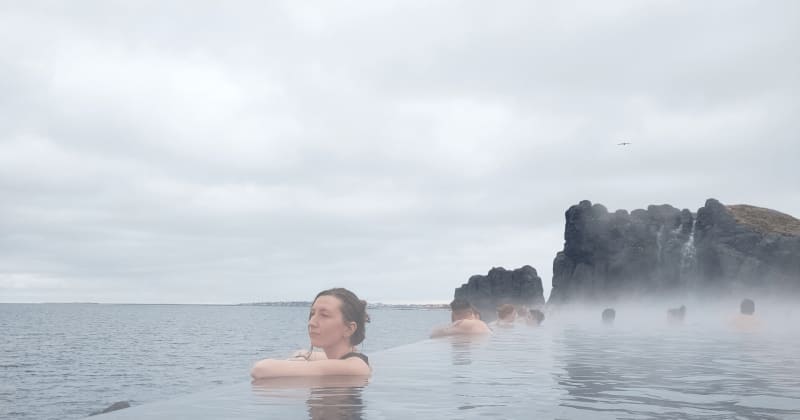
Savor the Journey:
- Take Your Time: The beauty of a campervan trip is there's no rush. If a place captivates you, stay longer. If you feel like moving on, hit the road.
- Capture Memories: Document your journey, whether through photos, journaling, or even sketching. These memories will be priceless.
Stay Eco-Conscious:
- Leave No Trace: Always clean up after yourself, disposing of waste responsibly and minimizing your environmental footprint.
- Use Established Campsites: While it might be tempting to camp anywhere, using established campsites ensures you're not harming delicate ecosystems.
Safety First:
- Know Your Vehicle: Familiarize yourself with your campervan's operations and limitations.
- Drive Carefully: Icelandic roads can be challenging, especially in remote areas. Always drive according to conditions and never take unnecessary risks.
Embrace the Experience:
- Outdoor Activities: Make the most of Iceland's natural playground by hiking, bird-watching, or even taking a dip in a geothermal pool.
- Night Sky Wonders: If traveling in winter, keep an eye out for the Northern Lights. In summer, enjoy the ethereal beauty of the midnight sun.
Stay Informed:
- Local News and Updates: Stay updated with local news, especially regarding road closures or any natural events.
- Apps and Guides: Utilize travel apps and guides specific to Iceland to enhance your journey and stay informed.
Frequently Asked Questions
1. What is the best time of year to travel the Golden Circle Route?
- The Golden Circle is accessible year-round. Summer offers longer daylight hours and milder weather, while winter can provide a snowy landscape and potential Northern Lights sightings.
2. Are there specific campsites along the South Coast?
- Yes, there are numerous campsites along the South Coast, such as Skógafoss Camping and Skaftafell Camping. Always check their opening seasons and amenities before planning your stay.
3. Do I need a special permit to drive in Snæfellsnes Peninsula or Westfjords?
- No special permit is required. However, always check road conditions, especially in winter, as some roads might be closed or require a 4x4 vehicle.
4. How long does it take to drive around Iceland in a campervan?
- A full circle of the Ring Road (Route 1) typically takes 7-10 days. However, adding detours like the Snæfellsnes Peninsula or Westfjords can extend your journey.
5. Are there any restrictions on where I can park my campervan overnight?
- Yes, wild camping is prohibited in Iceland. You must stay in designated campsites or areas that have received explicit permission from landowners.
6. Is it safe to drink water from streams or rivers during my campervan journey?
- Icelandic water is some of the purest in the world. However, always ensure you're sourcing from a clear, running stream away from any potential contaminants. When in doubt, use water from designated drinking sources.
